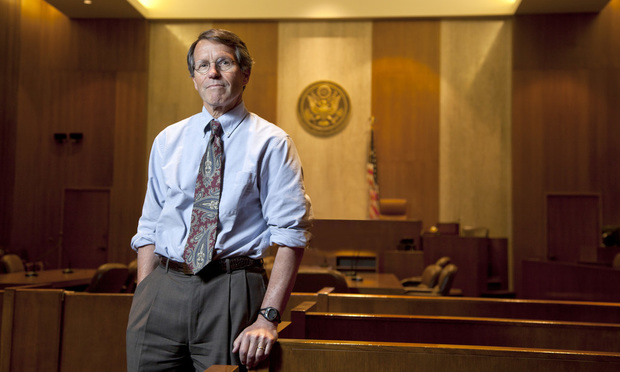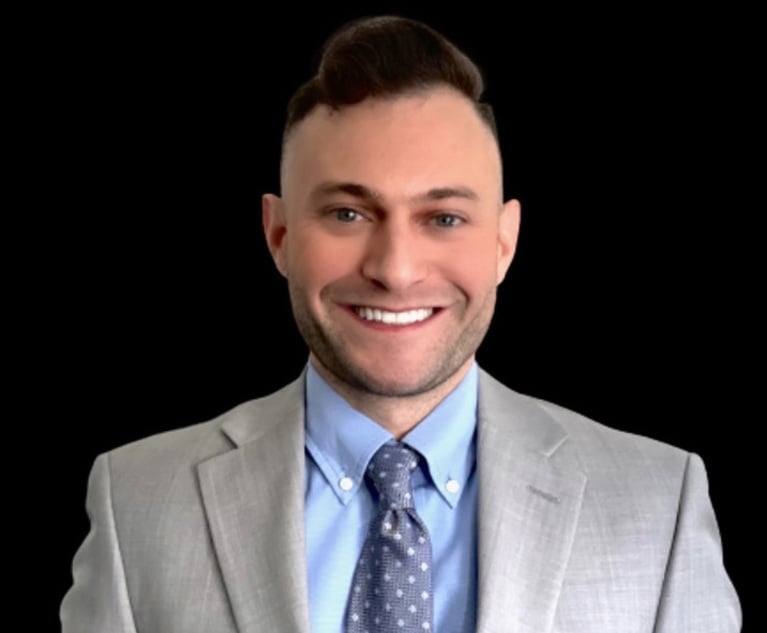Judge Wary of 'Abortion-Related Issues' as Trial Starts Over Secret Recordings of Planned Parenthood Officials
"I need to emphasize what this case is not about," Judge William Orrick III said as he repeatedly pushed attorneys away from the broader political issues surrounding abortion.
October 03, 2019 at 04:30 PM
4 minute read
 Judge William Orrick III, U.S. District Court for the Northern District of California. (Photo: S. Todd Rogers/ALM.)
Judge William Orrick III, U.S. District Court for the Northern District of California. (Photo: S. Todd Rogers/ALM.)
SAN FRANCISCO—Opening arguments in Planned Parenthood's lawsuit against a group of anti-abortion activists who infiltrated conferences and took clandestine videos meant to discredit the organization and its affiliates, made this much clear: The federal judge overseeing the trial will have his hands full over the next six weeks in keeping lawyers on-topic.
U.S. District Judge William Orrick III, who has overseen the case since it was filed in 2016 has made clear to the parties that he wants the trial to focus on the strategies used by the defendants—five individuals and two corporations who worked on what they describe as an undercover journalism project to investigative whether Planned Parenthood and its affiliates illegally profited from the sale of fetal tissue. Some of the individual defendants used fake drivers licenses to gain access to Planned Parenthood conferences and facilities to make surreptitious recordings.
Orrick has tailored the trial to consider Planned Parenthood's claims of fraud, trespass, breach of contract, illegal recording, civil conspiracy, and violation of the Racketeer Influenced and Corrupt Organizations Act.
"I need to emphasize what this case is not about," Orrick said in preliminary instruction to jurors before Thursday morning's openings. "It is not about the truth of whether plaintiffs profited from the sale of fetal tissue or otherwise violated the law in securing tissue for those programs. It is not about whether any plaintiff actually engaged in illegal conduct. Those issues are a matter of dispute between the parties in the world outside this courtroom."
Planned Parenthood's lead lawyer, Rhonda Trotter of Arnold & Porter Kaye Scholer said in her opening remarks that the defendants had a plan "to use any means, including illegal means, to try to destroy Planned Parenthood."
She described David Daleiden, the 30-year-old anti-abortion activist at the center of the case as "the ringleader" of "a conspiracy to lie and to make surreptitious recordings of Planned Parenthood employees without its knowledge and without its consent. Trotter said Daleiden formed the nonprofit Center for Medical Progress, or CMP, one of the corporate defendants, with an innocuous name meant to disguise its agenda.
Trotter called BioMax Procurement Services, a CMP affiliate, a "sham" company complete with fake brochures and fake job titles created to get access to abortion industry conferences. Daleiden and his associates, she said, signed exhibitor and confidentiality agreements, and despite provisions barring recording and sharing information, filmed more than 500 hours of footage.
When the defendants began releasing edited portions of the footage in July 2015, Trotter said the release set off "apprehension and fear" across Planned Parenthood. The organization has since adopted additional vetting procedures and beefed up its security. She said Planned Parenthood would ask for damages to restore the money it had to spend as a result of the defendant's actions, but did not specify an amount.
Harmeet Dhillon of Dhillon Law Group, who represents Daleiden and the corporate defendants, framed the dispute as "the story of what happens when a powerful corporation gets a little critical publicity" and hits back at a "small startup company."
Dhillon, who was one of six defense lawyers who spoke during openings, said that for Planned Parenthood to prove its fraud claims, the organization would need to show that it reasonably relied on representations made by the defendants. There, she said, Planned Parenthood failed to do any due diligence, made no office visits, and didn't look up the social media accounts of the individual defendants. Dhillon said to gain access to a National Abortion Federation Conference, where some of the first recordings were made, the defendants just had to pay a $3,000 fee to register as an exhibitor and complete registration forms.
"There was no muss and no fuss. Pay your money and come on in," she said.
Dhillon further contended that Planned Parenthood and its employees had no reasonable expectation of privacy in the recorded conversations, which often took place in crowded hotel ballrooms and restaurants where waiters and staff were frequently within earshot.
Orrick, in pretrial rulings, allowed defendants to testify about what they believed about Planned Parenthood's practices going into the recording project and the basis for those beliefs. But on Thursday, he stopped multiple defense lawyers during opening statements when they went into fine detail.
"This trial is not about the truth of any of the abortion-related issues," the judge said.
This content has been archived. It is available through our partners, LexisNexis® and Bloomberg Law.
To view this content, please continue to their sites.
Not a Lexis Subscriber?
Subscribe Now
Not a Bloomberg Law Subscriber?
Subscribe Now
NOT FOR REPRINT
© 2025 ALM Global, LLC, All Rights Reserved. Request academic re-use from www.copyright.com. All other uses, submit a request to [email protected]. For more information visit Asset & Logo Licensing.
You Might Like
View All



'Pull Back the Curtain': Ex-NFL Players Seek Discovery in Lawsuit Over League's Disability Plan
Trending Stories
- 1Blank Rome Adds Life Sciences Trio From Reed Smith
- 2Divided State Supreme Court Clears the Way for Child Sexual Abuse Cases Against Church, Schools
- 3From Hospital Bed to Legal Insights: Lessons in Life, Law, and Lawyering
- 4‘Diminishing Returns’: Is the Superstar Supreme Court Lawyer Overvalued?
- 5LinkedIn Accused of Sharing LinkedIn Learning Video Data With Meta
Who Got The Work
J. Brugh Lower of Gibbons has entered an appearance for industrial equipment supplier Devco Corporation in a pending trademark infringement lawsuit. The suit, accusing the defendant of selling knock-off Graco products, was filed Dec. 18 in New Jersey District Court by Rivkin Radler on behalf of Graco Inc. and Graco Minnesota. The case, assigned to U.S. District Judge Zahid N. Quraishi, is 3:24-cv-11294, Graco Inc. et al v. Devco Corporation.
Who Got The Work
Rebecca Maller-Stein and Kent A. Yalowitz of Arnold & Porter Kaye Scholer have entered their appearances for Hanaco Venture Capital and its executives, Lior Prosor and David Frankel, in a pending securities lawsuit. The action, filed on Dec. 24 in New York Southern District Court by Zell, Aron & Co. on behalf of Goldeneye Advisors, accuses the defendants of negligently and fraudulently managing the plaintiff's $1 million investment. The case, assigned to U.S. District Judge Vernon S. Broderick, is 1:24-cv-09918, Goldeneye Advisors, LLC v. Hanaco Venture Capital, Ltd. et al.
Who Got The Work
Attorneys from A&O Shearman has stepped in as defense counsel for Toronto-Dominion Bank and other defendants in a pending securities class action. The suit, filed Dec. 11 in New York Southern District Court by Bleichmar Fonti & Auld, accuses the defendants of concealing the bank's 'pervasive' deficiencies in regards to its compliance with the Bank Secrecy Act and the quality of its anti-money laundering controls. The case, assigned to U.S. District Judge Arun Subramanian, is 1:24-cv-09445, Gonzalez v. The Toronto-Dominion Bank et al.
Who Got The Work
Crown Castle International, a Pennsylvania company providing shared communications infrastructure, has turned to Luke D. Wolf of Gordon Rees Scully Mansukhani to fend off a pending breach-of-contract lawsuit. The court action, filed Nov. 25 in Michigan Eastern District Court by Hooper Hathaway PC on behalf of The Town Residences LLC, accuses Crown Castle of failing to transfer approximately $30,000 in utility payments from T-Mobile in breach of a roof-top lease and assignment agreement. The case, assigned to U.S. District Judge Susan K. Declercq, is 2:24-cv-13131, The Town Residences LLC v. T-Mobile US, Inc. et al.
Who Got The Work
Wilfred P. Coronato and Daniel M. Schwartz of McCarter & English have stepped in as defense counsel to Electrolux Home Products Inc. in a pending product liability lawsuit. The court action, filed Nov. 26 in New York Eastern District Court by Poulos Lopiccolo PC and Nagel Rice LLP on behalf of David Stern, alleges that the defendant's refrigerators’ drawers and shelving repeatedly break and fall apart within months after purchase. The case, assigned to U.S. District Judge Joan M. Azrack, is 2:24-cv-08204, Stern v. Electrolux Home Products, Inc.
Featured Firms
Law Offices of Gary Martin Hays & Associates, P.C.
(470) 294-1674
Law Offices of Mark E. Salomone
(857) 444-6468
Smith & Hassler
(713) 739-1250






